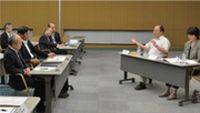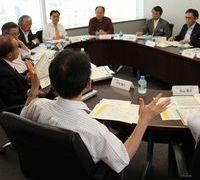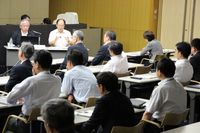Feature Story
Casio’s Commitment to Human Rights
As management globalizes, respect for human rights has become a vital issue for companies. Casio is developing a unique approach to the issue and working proactively to create mechanisms to address it. This Feature highlights the advice of Makoto Teranaka of Tokyo Keizai University, and outlines the steps Casio is taking.
Addressing Human Rights Issues the Right Way
Getting the Proper Perspective on Human Rights
Everyone probably has a different idea of what specifically should be done to ensure respect for human rights. Human rights concerns arise in a wide range of contexts, including conflict and child labor, as well as discrimination in workplaces based on nationality, place of birth, religion, gender, sexual orientation and so forth. Many of you may think these issues are far removed from your own company. Nevertheless, every company invariably has some kind of human rights problem that must be addressed. There are many more examples than the ones I just mentioned, and human rights awareness takes many forms, depending on the laws and culture of each country, as well as the differing views of individuals. In other words, it is very appropriate to say that human rights issues exist in every organization.
Addressing human rights issues does not mean actually reducing them to zero. The important thing is to try and see things from the perspective of those victims whose human rights are abused. By considering why the people concerned are dissatisfied and what methods should be used to address the issue, you will be able to see problems that you had not recognized before. Then, you will realize that you can find more human rights issues that need to be addressed. Therefore, it is important for companies to try to identify and address as many potential human rights issues as possible. When addressing human right issues, the process of uncovering the issues is the most challenging and important.
How Should Casio Address Human Rights?

Makoto Teranaka, Visiting Professor, Tokyo Keizai University
Through my participation in Casio events such as the stakeholder dialogue, the Human Rights Roundtable and a meeting of CSR Committee held in 2012, I have been able to hear frank views from many Casio employees working on the frontlines. The results of the questionnaire survey show that Casio sites around the world are responding decisively based on their respective laws and cultures. However, employees still seem to have a very vague overall notion of why Casio is addressing respect for human rights, including a vague understanding of human rights itself.
I think that Casio employees are implementing “obligatory” initiatives including compliance efforts, with a very high level of awareness. However, if they try to tackle human right issues in the same manner, they may get stuck on trying to reduce human rights issues to zero, as I mentioned earlier. The important thing is to consider specific ways to incorporate respect for human rights into management, based on an awareness of the importance of actually protecting human rights. In other words, you must create strong Casio policies on human rights, and implement them. It is now clear to me that Casio has more than enough ability to promote CSR initiatives from a management perspective. I hope you will continue to advance your CSR efforts even further.
Process for Casio’s Human Rights Initiatives
Stakeholder Dialogue (June 22, 2012)

Makoto Teranaka gave a talk on corporate activities and human rights. He was then joined by Kaori Kuroda, and they responded to questions and comments from the audience. The dialogue event covered the following three themes: (1) how to address human rights issues; (2) criteria for determining such issues; and (3) human rights problems of employees including hiring of foreign workers.
*See here for more datails on the stakeholder dialogue.
Human Rights Questionnaire (February and March 2013)
A questionnaire on human rights and business practices was sent to 34 Casio group companies in and outside Japan. It contained 15 questions on human rights awareness, labor management, compliance, religious considerations, and employee hotlines. The compiled survey results were shared with all the group companies.
Human Rights Roundtable (May 14, 2013)

Using the survey results, Teranaka spoke with employees that deal particularly directly with human right issues in their jobs (i.e., those in recruitment, labor relations, sales, supply chain relations, and those working at Casio sites outside Japan). After sharing how human rights are viewed at the main sites of the Casio group, and what efforts are being carried out, Teranaka provided them with advice on future initiatives. In the second half of the roundtable, the participants also discussed the need for a shared human rights policy, and the importance of having clear policies for the entire Casio group.
CSR Committee Meeting (May 28, 2013)

The results of the Human Rights Survey and Roundtable were reported to the CSR Committee, and Teranaka was invited to attend. He reported on specific comments made in the Roundtable, and offered his opinion on how Casio should approach human rights issues in the future.
Next Steps
Based on the analysis results and content of the discussions, Casio recognizes it is important to globally improve governance structures for protecting human rights. Accordingly, a Casio Human Rights Policy will be established in fiscal 2014. The group also aims to establish a Casio Human Rights Investigation Tool, in order to clarify human rights infringement and the scope of responsibility.
